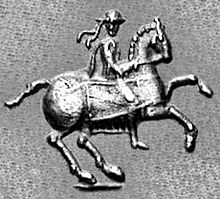| Antimachus II Nikephoros "The Victorious" | |
|---|---|
 Antimachus II on horseback | |
| Indo-Greek king | |
| Reign | 174–165 BCE |
| Dynasty | Euthydemid dynasty |
| Father | Antimachus I or Demetrius II |
Antimachus II Nikephoros (Greek: Ἀντίμαχος Β΄ ὁ Νικηφόρος; the epithet means "the Victorious") was an Indo-Greek king. He ruled a vast territory from the Hindu-Kush to the Punjab around 170 BCE. He was almost certainly the eponymous son of Antimachus I, who is known from a unique preserved tax receipt.[1] Osmund Bopearachchi dated Antimachus II to 160–155 BCE on numismatical grounds, but changed this to 174–165 BCE after the tax receipt was revealed to synchronise his reign with that of Antimachus I.[2] R. C. Senior has not dated Antimachus II but thinks that his coins were possibly Indian issues of Antimachus I, despite their different epithets and coin types.
In both of Boperachchi's reconstructions, Antimachus II was succeeded by Menander I who inherited three of his four monograms. Antimachus II probably fought against the Greco-Bactrian king Eucratides I, who had dethroned his father in Bactria.